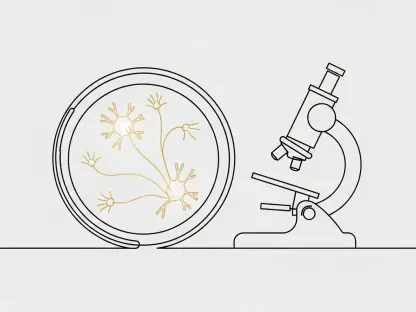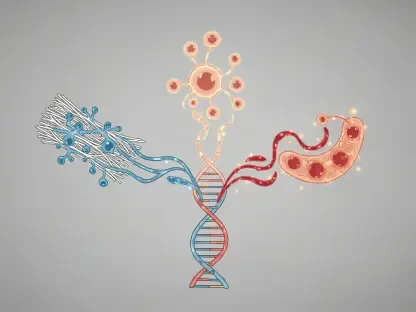The ever-evolving battle against bowel cancer has encountered a formidable challenge: drug resistance. Bowel cancer, one of the most common cancers in the U.K., affects over 44,000 individuals annually, pushing scientists to devise new tools for predicting how this cancer can evolve against chemotherapy. The emergence of drug resistance compromises the efficacy of long-standing cancer treatments, necessitating an innovative approach to anticipate and counteract these changes. In this context, groundbreaking research has paved the way for advanced tools that leverage mathematical modeling and evolutionary biology to predict potential resistance in cancer cells.
Features and Performance Analysis
The forefront feature of this scientific innovation focuses on genetic mutation analysis. Nearly every cancer case displays unique genetic characteristics that can mutate, leading to resistance against drugs. This tool meticulously maps out these potential mutations and provides insights into how they proliferate as cancer cells continue to divide. By pinpointing mutations that prompt resistance, this technology aims to tailor chemotherapy protocols more precisely. This analysis has not only transformed our understanding but also improved the likelihood of developing effective cancer therapies.
Equally significant, the non-genetic change monitoring aspect rigorously examines factors beyond mere genetic mutations. This approach integrates with genetic analyses to deliver a comprehensive overview of how non-genetic changes like epigenetic variations and metabolic shifts contribute to resistance. This component’s real-world application reveals its success in the detailed tracking of cellular behaviors, thus enabling clinicians to anticipate resistance patterns and modify treatment regimens accordingly. With its technical sophistication, this monitoring process enhances the tool’s predictive accuracy and operational efficiency in clinical settings.
Recent Developments and Applications
The last couple of years have witnessed the fruition of innovative methodologies, like Evolutionary Informed Resistance Assays (EIRAs), to enrich pharmaceutical development. The EIRA method came about through collaboration between the Institute of Cancer Research in London and Queen Mary University of London. This approach empowers the customization of treatments to suit individual patient needs, aligning therapies with the peculiar evolutionary pathways of tumor drug resistance. With the support of organizations such as the Wellcome Trust and Cancer Research U.K., significant strides have been catalyzed in both research and clinical applications.
Prominent researchers stress the importance of this innovation across a spectrum of cancers beyond bowel cancer, offering hope for mitigating resistance in other types like ovarian and breast cancers. One of the unique applications of this technology lies in its potential to increase the lifespan and improve the quality of life for patients—by tailoring drug dosages and combinations to minimize resistance. Anchored in machine learning and evolutionary biology, this tool identifies new therapeutic targets and paves the way for more personalized and effective cancer treatment strategies.
Challenges and Future Considerations
Despite its promising strides, this burgeoning field confronts several challenges. Key among these are the inherent variabilities in patient genetic makeup and the complexity of cancer cell dynamics, which create hurdles in predicting consistent outcomes. Regulatory barriers also present obstacles as this cutting-edge technology navigates through industry standards and approvals. Ongoing efforts to address these challenges include in-depth clinical trials and partnerships with commercial entities to streamline technological advancements.
Looking ahead, the potential breakthroughs from this technology could be monumental. As researchers continue to refine their understanding of drug resistance pathways, the prospect of future collaborations extends to creating a universal framework applicable to diverse cancer types. The further integration of machine learning algorithms may unlock new dimensions of drug resistance prediction, ensuring therapies are more bespoke and responsive to individual cancer evolutions. Continuing to harness interdisciplinary expertise will be crucial in realizing the long-term impact of these tools.
Review Conclusion
The review of drug resistance prediction tools highlights significant progress in combating cancer’s adaptability. These tools have demonstrated an advanced capacity for mapping genetic and non-genetic landscapes, offering profound implications for clinical oncology. By leveraging EIRAs and developing tailored treatment methodologies, the technology has widened the horizon for personalized medicine. As ongoing research and development refine these innovations, it is likely that they will redefine future cancer treatment protocols, potentially saving countless lives and revolutionizing the therapeutic landscape.









